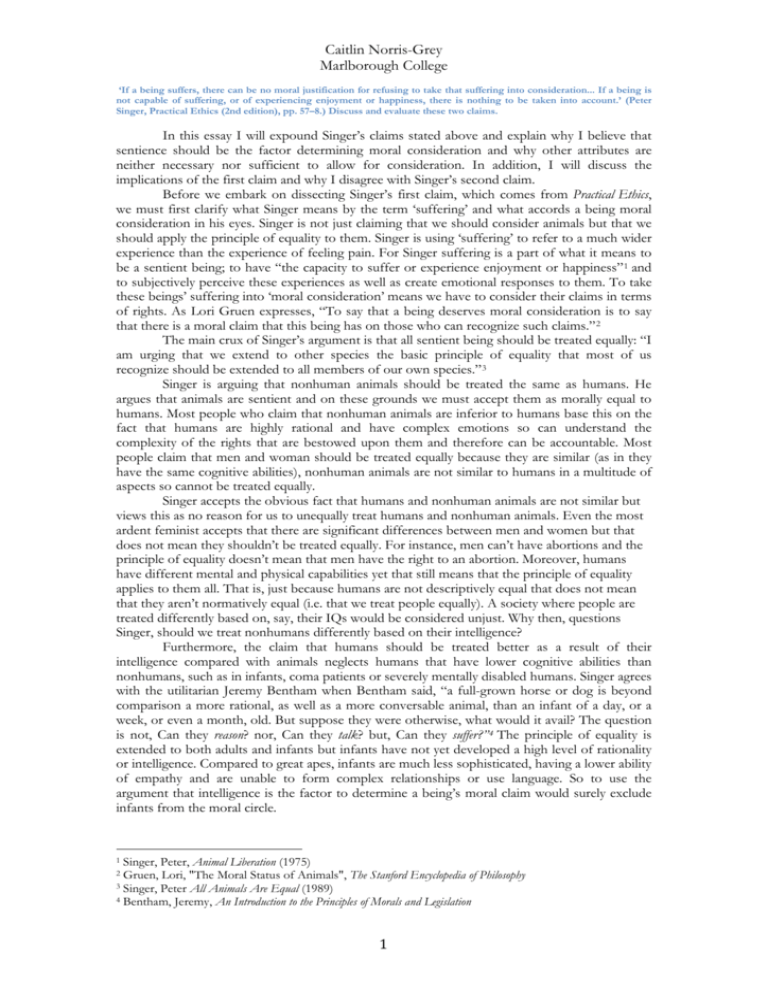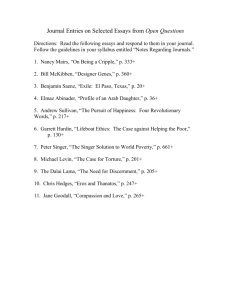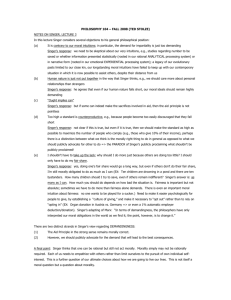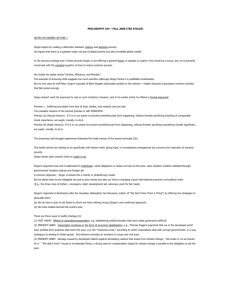here - Marlborough College
advertisement

Caitlin Norris-Grey Marlborough College ‘If a being suffers, there can be no moral justification for refusing to take that suffering into consideration... If a being is not capable of suffering, or of experiencing enjoyment or happiness, there is nothing to be taken into account.’ (Peter Singer, Practical Ethics (2nd edition), pp. 57–8.) Discuss and evaluate these two claims. In this essay I will expound Singer’s claims stated above and explain why I believe that sentience should be the factor determining moral consideration and why other attributes are neither necessary nor sufficient to allow for consideration. In addition, I will discuss the implications of the first claim and why I disagree with Singer’s second claim. Before we embark on dissecting Singer’s first claim, which comes from Practical Ethics, we must first clarify what Singer means by the term ‘suffering’ and what accords a being moral consideration in his eyes. Singer is not just claiming that we should consider animals but that we should apply the principle of equality to them. Singer is using ‘suffering’ to refer to a much wider experience than the experience of feeling pain. For Singer suffering is a part of what it means to be a sentient being; to have “the capacity to suffer or experience enjoyment or happiness” 1 and to subjectively perceive these experiences as well as create emotional responses to them. To take these beings’ suffering into ‘moral consideration’ means we have to consider their claims in terms of rights. As Lori Gruen expresses, “To say that a being deserves moral consideration is to say that there is a moral claim that this being has on those who can recognize such claims.” 2 The main crux of Singer’s argument is that all sentient being should be treated equally: “I am urging that we extend to other species the basic principle of equality that most of us recognize should be extended to all members of our own species.” 3 Singer is arguing that nonhuman animals should be treated the same as humans. He argues that animals are sentient and on these grounds we must accept them as morally equal to humans. Most people who claim that nonhuman animals are inferior to humans base this on the fact that humans are highly rational and have complex emotions so can understand the complexity of the rights that are bestowed upon them and therefore can be accountable. Most people claim that men and woman should be treated equally because they are similar (as in they have the same cognitive abilities), nonhuman animals are not similar to humans in a multitude of aspects so cannot be treated equally. Singer accepts the obvious fact that humans and nonhuman animals are not similar but views this as no reason for us to unequally treat humans and nonhuman animals. Even the most ardent feminist accepts that there are significant differences between men and women but that does not mean they shouldn’t be treated equally. For instance, men can’t have abortions and the principle of equality doesn’t mean that men have the right to an abortion. Moreover, humans have different mental and physical capabilities yet that still means that the principle of equality applies to them all. That is, just because humans are not descriptively equal that does not mean that they aren’t normatively equal (i.e. that we treat people equally). A society where people are treated differently based on, say, their IQs would be considered unjust. Why then, questions Singer, should we treat nonhumans differently based on their intelligence? Furthermore, the claim that humans should be treated better as a result of their intelligence compared with animals neglects humans that have lower cognitive abilities than nonhumans, such as in infants, coma patients or severely mentally disabled humans. Singer agrees with the utilitarian Jeremy Bentham when Bentham said, “a full-grown horse or dog is beyond comparison a more rational, as well as a more conversable animal, than an infant of a day, or a week, or even a month, old. But suppose they were otherwise, what would it avail? The question is not, Can they reason? nor, Can they talk? but, Can they suffer?” 4 The principle of equality is extended to both adults and infants but infants have not yet developed a high level of rationality or intelligence. Compared to great apes, infants are much less sophisticated, having a lower ability of empathy and are unable to form complex relationships or use language. So to use the argument that intelligence is the factor to determine a being’s moral claim would surely exclude infants from the moral circle. Singer, Peter, Animal Liberation (1975) Gruen, Lori, "The Moral Status of Animals", The Stanford Encyclopedia of Philosophy 3 Singer, Peter All Animals Are Equal (1989) 4 Bentham, Jeremy, An Introduction to the Principles of Morals and Legislation 1 2 1 Caitlin Norris-Grey Marlborough College Counter-arguments to this state that the infant has the potential to become a rational being so is still entitled to equality in virtue of their future position within the moral circle or community. But Singer replies saying that to use the argument of potentiality means that one must ban contraception or even abstinence as it prevents the gametes’ potential to form a rational being. To apply the principle of equality to potential beings is clearly not a strong argument. Furthermore, in our society the principle of equality is bestowed to a severely mentally disabled person despite lower levels of intelligence and the inability use language. In these cases the reduced rationality is permanent so the potential of that disabled person is similar to some nonhumans. Yet they are still included into the moral circle, whilst highly advanced apes are not. After having broken apart the argument for greater rights to humans based on the capacity for intelligence, this leaves little else to differentiate our moral claims from the claims of nonhumans. Some may argue that simply being a member of the Homo sapiens species entitles humans to be treated equally, that this is the only requirement to be included in the moral circle. Singer rejects this idea wholeheartedly, saying that to distinguish the rights of humans and nonhumans based solely on the difference in species is akin to racism or sexism. Singer argues that species membership is an arbitrary means of creating the barrier of inequality. Singer and other philosophers concerned with the rise of speciesism would argue that suffering is quantitatively comparable between different species and should be equally considered. This is not to say, however, that human and nonhuman suffering is always the same. If I slapped the backside of a horse, the suffering of the horse would not be as much as if I did the same thing to a baby. If I then hit the horse with a large and heavy object, the horse would then feel comparable pain as the baby did. When talking about the pain of humans and nonhumans, equal consideration does not mean that nonhumans should be subject to the same actions that humans are. “Equal consideration of interests”, to put it in Singer’s words, means that the actuality of the suffering that a being experiences should be taken into account. For instance, a human dying from cancer may suffer more than a mouse dying from the same disease would. The human may suffer not only from the physical pain of the disease but the emotional anxiety that arises when faced with death. Humans as more intellectually complex beings (in most cases) often suffer from the worry of past or future events. The ability to empathise and have self-awareness also gives humans greater suffering when contemplating how their potential death may impact others. Immanuel Kant would have disagreed with Singer’s claim. Moral consideration, according to Kant, is reserved for humans only. He argued that humans are rational agents who can understand the moral and ethical decisions involved in everyday life. Nonhumans, on the other hand, are not rational as they cannot understand their duties as moral agents. However, I reject Kant’s claim that a moral agent has duties which they must be able to understand to have moral consideration. Kant based his argument on the fact that humans are rational and autonomous beings. Whilst true in most cases we must look again to the marginal cases to see that Kant’s argument for human rationality does not stand up. In the cases of severely mentally handicapped humans, rationality cannot be the determining factor for moral consideration, or else we would have a society that excludes the mentally disabled. Peter Harrison furthers this claim that nonhuman animals do not feel pain. Harrison states that the Argument from Analogy that Singer uses is flawed; just because humans and nonhuman animals respond to stimuli in the same way, it does not mean that they suffer in the same way. Pain behaviour is neither necessary nor sufficient for the experience of pain. Robots may be programmed to respond to pain but one would not accept that they are sentient beings. One could, however, apply this principle to all apparently sentient beings, including humans and argue that the only pain that is felt is your own. This solipsist idea achieves little in this debate as one could not determine if they were any sentient beings at all. Whilst scientists have found various similarities between the anatomy and physiology of humans and nonhuman animals, this, argues Harrison, does not mean that nonhuman animals experience pain in the same way that humans do. Although these similarities have been found, scientists still don’t know how the anatomy and physiology of humans relate to the consciousness of humans and the way that humans subjectivity experience pain so it cannot be deduced that any similarities mean that animals also subjectivity feel pain or pleasure. Harrison claims that after arguing that the 2 Caitlin Norris-Grey Marlborough College sentience and consciousness of nonhumans cannot be deduced, the main crux of the argument for animal equality has been dismantled. This seems like compelling evidence to reject the proposition that sentience is not the basis to determine moral consideration, rather rationality it. The arguments above, however, are pure speculation and have little in the way of solid evidence to support them. However, there is clear evidence that nonhuman animals create subjective and emotional responses to stimuli. Charles Darwin noted, in The Descent of Man, “the grief of female monkeys for the loss of their young, that it invariably caused the death of certain kinds” 5 which has been seen by many other scientists since Darwin wrote this. We can see that nonhuman animals do indeed feel pain and pleasure. So far I have mainly focused on the first of Singer’s claims but the second claim has profound implications on the rights of those who are not considered sentient being, in particular foetuses and coma patients. There is strong evidence that foetuses do not feel pain before 24 weeks, and that foetuses do not have the capacity to experience pleasure or interests (i.e. to be sentient) even after birth. According to Singer’s claim, if foetuses do not feel pain then they have no moral claims (Kant I. , 1993) to be taken into account. The implications of this claim are very controversial and have many implications in modern society. For example, Singer justifies abortion throughout pregnancy and even condones infanticide for newborn babies. The main argument against abortion states that a foetus is an innocent human being, it is morally wrong to murder an innocent human therefore abortion is wrong. Singer argues that the second premise is not valid, as regardless of species, it is sentience that determines your right to life. As a preference utilitarian, Singer argues that what is in the interests of the majority is the morally correct action to take, and since foetuses have no interests, as suffering is a prerequisite for having interests, they hold no moral claim. If the mother wants to have an abortion, at whatever stage of the pregnancy, Singer argues that she is entitled to have that abortion. In addition to this, Singer suggests that a newborn infant has no interests and so if the mother feels that the infant would not result in an increase of happiness then than infant could be euthanised. Whilst I agree with the principle that foetuses are not yet cerebrally advanced enough to be considered rational and sentient beings, I don’t agree with the conclusions that Singer puts forward. As an act utilitarian, Singer believes in acting morally according to the preferences of the people involved. In his argument, Singer has neglected the rest of society and what their interests are. Aborting a 30week-old foetus or killing a newborn child may be in the interests of the mother but it also may upset many members of society who feel that this is murder. I do believe that in some cases the reasons for aborting the foetus or euthanising the infant may outweigh the potential upset felt by those against abortion. For example, an infant who is born severely disabled and will most likely live a life of pain that will be cut short by their illness, if the mother does not want to care for this child or if she doesn’t want to go through the mental torment of watching her child suffer and die then her interests would outweigh the interests of society. Having said that, I am not suggesting that the life of a disabled child is valued less than that of an abled child, simply that the interests of those involved need to be considered. People in a permanent vegetative comatose state will stay that way until they die. They are unable to experience pain, pleasure, or any other emotion and cannot make the decision whether to end their life or not. Singer argues that in these cases it is justifiable to switch off their life support machine, or administer a lethal injection so the patient dies. In lacking the ability to be sentient, Singer claims that these people also lose a moral claim to be kept alive. I again agree with Singer in that coma patients lack any interests that may be taken into account but I disagree in the sense that one must look in society as a whole to determine the patients who should be allowed to die. We must look to the family and friends of the patient who will be greatly affected by euthanising the patient The issue of ‘equality of all’ is one of the most discussed topics in philosophy at the moment but little thought is given to the inclusion of animals in the moral circle. Peter Singer argues that it is the sentience of animals (both human and nonhuman) that grants them moral 5 Darwin, Charles, The Descent of Man (1871) 3 Caitlin Norris-Grey Marlborough College consideration whilst other philosophers such as Kant and Descartes disagree with Singer, claiming that it is the rationality and autonomy of humans, and the lack of such attributes in nonhumans, that explains that only humans should be taken into moral consideration. Kant and Descartes’ argument of the importance of rationality would exclude the severely mentally disabled, and other members of society without sufficient cognitive abilities to reason with moral decisions, from moral consideration. In addition, any other reason to exclude nonhuman animals from this consideration based purely on species is without valid reason and is unacceptable. To create an arbitrary characteristic to lay out the barrier of equality is comparable to abhorrent beliefs such as racism or sexism. Therefore sentience is the underlying quality to evaluate whether a being is entitled to moral consideration. However, Singer’s second claim asserts that sentience is the soul aspect required to determine a moral claim. In such cases as in coma patients or newborn babies, the argument cannot be reduced to the sentience of the patient or infant. Other interest must also be considered when deciding the fate of these beings. 4 Caitlin Norris-Grey Marlborough College Bibliography Bentham, J. (1823). An Intoduction to the Principles of Morals and Legislation. Oxford: Clarendon Press. Carruthers, P. (1992). The Animals Issue. Cambridge: Cambridge Univeristy Press. Darwin, C. (1871). The Descent of Man. London: John Murray. DeGrazia, D. (2002). Animal Rights. New York: Oxford University Press. Harrison, P. (1991). Do Animals Feel Pain? Philosophy , 25-40. Kant, I. (1993). Critique of Practical Reason. Prentice Hall. Kant, I. (1993). Grounding for the Metaphysics of Morals. Cambridge: Hackett Publishing Company. Palmer, M. (1999). Moral Problems in Medicine. Cambridge: The Lutterworth Press. Singer, P. (1989). All Animals are Equal. New Jersey. Singer, P. (2001). Animal Liberation. Ecco Press. Singer, P. (1993). Practical Ethics. Cambridge: Cambridge University Publishing. Singer, P. (2011). The Exanding Circle. Princeton University Press. Warburton, N. (2011). A Little History of Philosophy. Padstow: Yale University Press. 5





